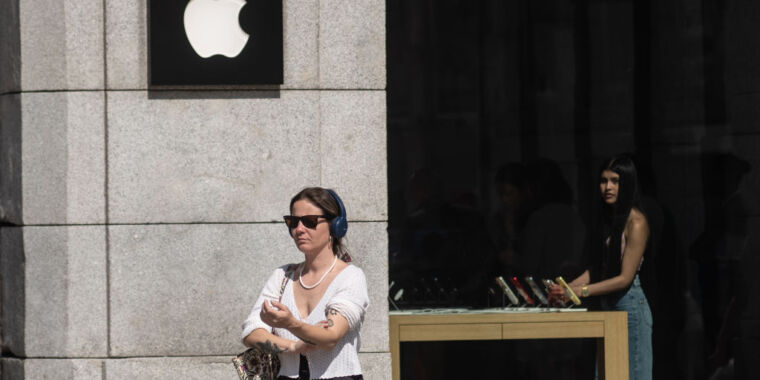Apple has spent years “intentionally, knowingly, and deliberately paying women less than men for substantially similar work,” a proposed class action lawsuit filed in California on Thursday alleged.
A victory for women suing could mean that more than 12,000 current and former female employees in California could collectively claw back potentially millions in lost wages from an apparently ever-widening wage gap allegedly perpetuated by Apple policies.
The lawsuit was filed by two employees who have each been with Apple for more than a decade, Justina Jong and Amina Salgado. They claimed that Apple violated California employment laws between 2020 and 2024 by unfairly discriminating against California-based female employees in Apple’s engineering, marketing, and AppleCare divisions and “systematically” paying women “lower compensation than men with similar education and experience.”
Apple allegedly has displayed an ongoing bias toward male employees, offering them higher starting salaries and promoting them for the “same behaviors” that female employees allegedly were punished for.
Jong, currently a customer/technical training instructor on Apple’s global developer relations/app review team, said that she only became aware of a stark pay disparity by chance.
“One day, I saw a W-2 left on the office printer,” Jong said. “It belonged to my male colleague, who has the same job position. I noticed that he was being paid almost $10,000 more than me, even though we performed substantially similar work. This revelation made me feel terrible.”
But Salgado had long been aware of the problem. Salgado, currently on a temporary assignment as a development manager in the AppleCare division, spent years complaining about her lower wages, prompting Apple internal investigations that never led to salary increases.
Finally, late last year, Salgado’s insistence on fair pay was resolved after Apple hired a third-party firm that concluded she was “paid less than men performing substantially similar work.” Apple subsequently increased her pay rate but dodged responsibility for back pay that Salgado now seeks to recover.
Eve Cervantez, a lawyer for women suing, said in a press release shared with Ars that these women were put in “a no-win situation.”
“Once women are hired into a lower pay range at Apple, subsequent pay raises or any bonuses are tracked accordingly, meaning they don’t correct the gender pay gap,” Cervantez said. “Instead, they perpetuate and widen the gap because raises and bonuses are based on a percentage of the employee’s base salary.”
Apple did not immediately respond to Ars’ request to comment.








:max_bytes(150000):strip_icc()/roundup-writereditor-loved-deals-tout-f5de51f85de145b2b1eb99cdb7b6cb84.jpg)


